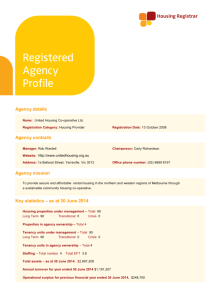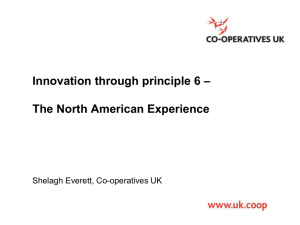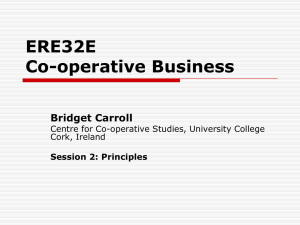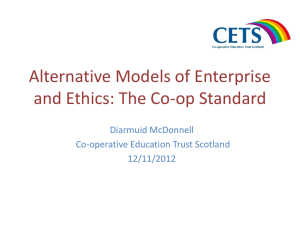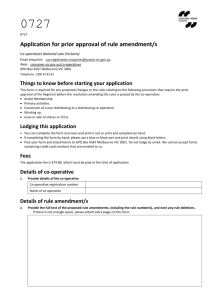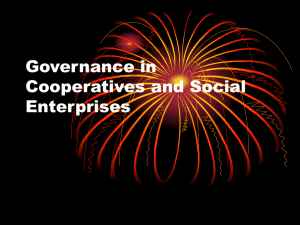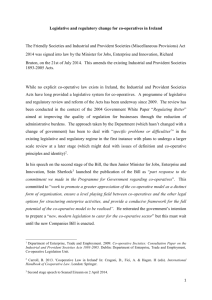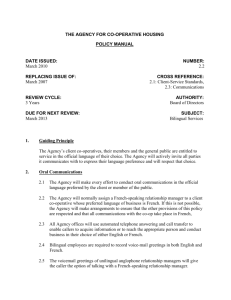Response to IFRS Foundation Trustees' Review of Structure and
advertisement
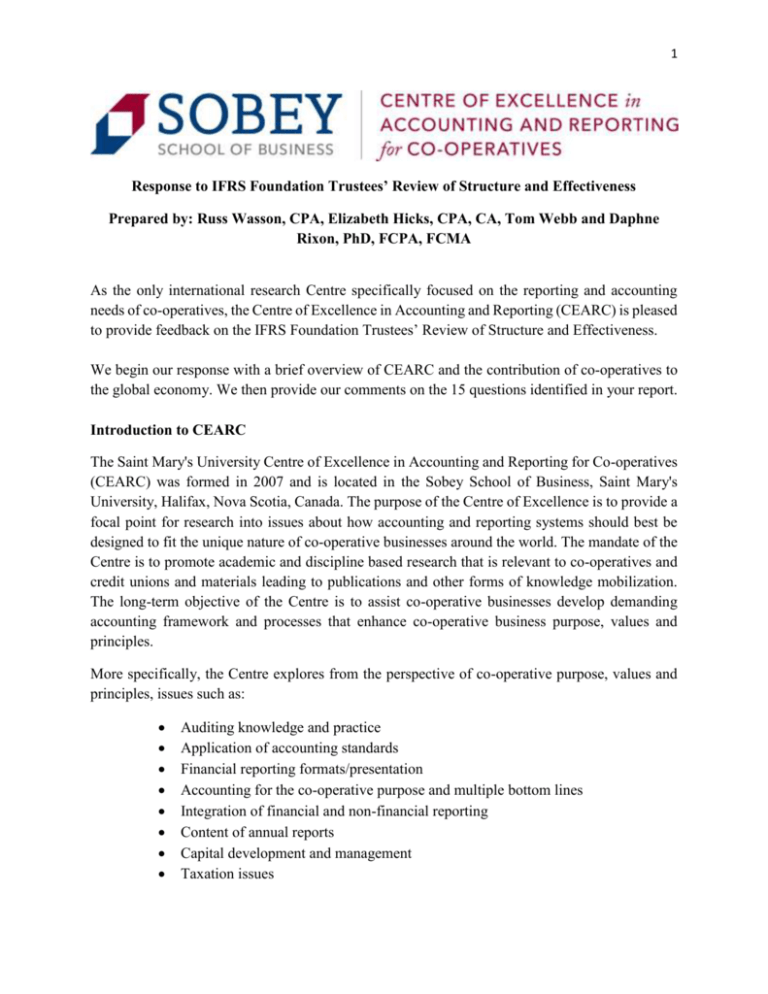
1 Response to IFRS Foundation Trustees’ Review of Structure and Effectiveness Prepared by: Russ Wasson, CPA, Elizabeth Hicks, CPA, CA, Tom Webb and Daphne Rixon, PhD, FCPA, FCMA As the only international research Centre specifically focused on the reporting and accounting needs of co-operatives, the Centre of Excellence in Accounting and Reporting (CEARC) is pleased to provide feedback on the IFRS Foundation Trustees’ Review of Structure and Effectiveness. We begin our response with a brief overview of CEARC and the contribution of co-operatives to the global economy. We then provide our comments on the 15 questions identified in your report. Introduction to CEARC The Saint Mary's University Centre of Excellence in Accounting and Reporting for Co-operatives (CEARC) was formed in 2007 and is located in the Sobey School of Business, Saint Mary's University, Halifax, Nova Scotia, Canada. The purpose of the Centre of Excellence is to provide a focal point for research into issues about how accounting and reporting systems should best be designed to fit the unique nature of co-operative businesses around the world. The mandate of the Centre is to promote academic and discipline based research that is relevant to co-operatives and credit unions and materials leading to publications and other forms of knowledge mobilization. The long-term objective of the Centre is to assist co-operative businesses develop demanding accounting framework and processes that enhance co-operative business purpose, values and principles. More specifically, the Centre explores from the perspective of co-operative purpose, values and principles, issues such as: Auditing knowledge and practice Application of accounting standards Financial reporting formats/presentation Accounting for the co-operative purpose and multiple bottom lines Integration of financial and non-financial reporting Content of annual reports Capital development and management Taxation issues 2 In an effort to address some of these issues, the Centre of Excellence in Accounting and Reporting for Co-operatives (CEARC) has published to date six International Statements of Reporting Practices (iSORPs) that identify how reporting for co-operatives should be different from that of for-profit publicly accountable enterprises. These are listed below with the full text available at: http://www.smu.ca/academics/sobey/cearc-isorp-project.html 1. iSORP #1 The objectives, scope and purpose – particularly with respect to recognizing members as the primary user of financial statements instead of the investor as is the case for investor owned companies (IOCs). 2. iSORP #2 Reporting Co-operative Members’ Funds – making the case that the balance sheet should reflect the many ways a member may contribute to a co-operative. It should disclose the full range and amount of members’ financial commitments (debt and equity) separate from that of non-members. 3. iSORP #3 Reporting payments to members – recommends that financial reports should distinguish among payments to members as part of the on-going operations of the business, patronage payments, and return on member equity. 4. iSORP #4 Reporting on membership: joining, participating and leaving – recommends that financial reports should disclose the process of joining, participating in and leaving the co-op and member economic, democratic participation and control. 5. iSORP #5 Environmental sustainability reporting – identifies the need for co-operatives to report on environmental sustainability and suggests a few key performance indicators (KPIs) in this regard. 6. iSORP #6 Non-financial reporting – discusses the need for co-operatives to report on other non-financial aspects as part of the ethical roots of co-operatives including member satisfaction, average % of members voting, employee remuneration multiple and number of other co-ops the co-op has dealings with. The Co-operative Sector As member-owned, member-run and member-serving businesses, co-operatives empower people to collectively realize their economic aspirations, while strengthening their social and human capital and developing their communities. The purpose of co-operative business, meeting member and community need, and its internationally accepted set of values and principles distinguishes it from other forms of business. Co-operatives need an accounting system that allows them to account for how responsibly they use their resources to achieve their purpose while respecting their declared values and principles. 3 According to the International Co-operative Alliance, Co-operatives contribute to sustainable economic growth and stable, quality employment, employing 250 million (indirect and induced employment not included). Within the G20 countries, co-operative employment makes up almost 12 % of the total employed population. Co-operative enterprises worldwide generate 2.2 trillion USD in turnover while providing the services and infrastructure society needs to thrive. The co-operative economy can be explored at: http://monitor.coop/ Co-operatives are businesses owned and run by and for their members. Whether the members are the customers, employees or residents they have an equal say in what the business does and a share in the profits. Responses to Specific Questions Posed by the IFRS Foundation Trustees’ Review of Structure and Effectiveness Q1 Considering the consequences referred to above, what are your views on whether the IASB should extend its remit beyond the current focus of the organisation to develop Standards; in particular for entities in the private, not-for-profit sector? Co-operatives are publicly accountable entities and are accountable to their members rather than shareholders. While being accountable to shareholders means maximizing profits and shareholder wealth now and in the future, accountability to members means meeting the needs of its members (i.e. the provision of goods and services) while contributing to the betterment of the community now and in the future. It is this fundamental difference in accountability that requires Standards be developed for the co-operative sector. While some current Standards “fit” the co-operative model, others do not. IFRS assumes a one size fits all approach will suffice which may yield nonsensical results for co-operatives and irrevocably harm the co-operative sector. Please refer to iSORPs #1 - #4 for a detailed discussion of some areas where current IFRS do not meet the needs of co-operatives. We firmly believe that accounting standards should not disproportionately disenfranchise any form of entity. We believe that accounting standards reflect the essence of a business model, and not unduly discriminate against entities that are not investor and profit driven. It should be noted that some co-operatives are considered to be for-profit enterprise, while other co-operatives operate on a not-for-profit basis, but are generally subject to IFRS as it applies to enterprises in general – that is, entities whose primary reason for existence is to earn a profit for investors than users. Historically, standard-setters have given little or no thought to the unique nature of co-ops when setting standards and more importantly it is questionable whether the standard setters have an understanding of co-ops. 4 Given the prevalence, size and impact of co-operatives around the world, we believe that it is imperative for the IASB to work with representatives of co-operative organizations to develop high quality standards which will become GAAP for the myriad forms of co-operatives. Using an accounting system that is based on the purpose of investor driven business focuses governance on a purpose co-operatives do not share and diverts attention away from issues at the core of cooperative purpose. We agree that the IASB should be on the forefront of areas outside the traditional role of financial reporting. However, we note that co-operatives have been historically bound to their member shareholders who are users of the business in ways that traditional corporations are not, since the members of co-operatives are their owners, but without the expectation of the appreciation in the price of their share. Q2 Do you agree with the proposal that the IASB should play an active role in developments in wider corporate reporting through the co-operation outlined above? We do strongly support the IASB playing an active role in developments in wider co-operative / corporate reporting. An important mission of co-operatives to provide and enhance social aims and goals within the community in sustainable ways. Consequently, the evolving field of social responsibility reporting is of primary importance to co-operatives worldwide. Current IFRS is sorely lacking when it comes to reporting on the multiple bottom-lines for co-operatives so we strongly support continued engagement with the International Integrated Reporting Council (IIRC), and through the Corporate Reporting Dialogue, such organizations as the CDP, GRI and CDSB. As participatory, democratic organizations, reporting on governance is also very important. We believe it is critical for co-operatives to report key performance indicators on a range of nonfinancial factors. This is particularly important since co-operatives are not publicly listed and are typically not evaluated by analysts. The use of financial and non-financial KPIs and related benchmarks is an effective way to evaluate performance. We believe as well that cooperatives need to understand the linkages between KPIs and financial health. Please refer to iSORPs #5 and #6 for more detailed analysis on this issue. Q3 Do you agree with the Foundation’s strategy with regard to the IFRS Taxonomy? While it is beneficial to have a taxonomy for the sake of consistency, in reality it is probably irrelevant for most co-operatives because by and large co-operatives do not trade on security exchanges and analysts do not analyze them. It also needs to take into account that standards need to be applied flexibly depending on the size of the co-operative business. 5 Q4 How can the IASB best support regulators in their efforts to improve digital access to general purpose financial reports to investors and other users? The development of a single set of GAAP for co-operatives worldwide will ensure that the varying needs of co-operatives will be met by the new form of IFRS-Coop. We would be happy to work with the IASB to develop a taxonomy which enables citizens to digitally locate and utilize the financial statements of co-operatives around the world. That being said, it is important to note that many co-ops do not make their financial reports public since they do not publicly trade. Ideally, these reports should be more widely available. Q5 Do you have any views or comments on whether there are any other steps the IASB should take to ensure that it factors into its thinking changes in technology in ways in which it can maintain the relevance of IFRS? We don’t believe that IFRS is as relevant as it could be for co-operatives. Given the size and worldwide distribution of the co-operative form of endeavor, we believe that the only way for IFRS to become more relevant to co-operatives and those they serve, is for the development of a comprehensive set of GAAP that becomes IFRS-coop. This will not require a wholesale rewrite of IFRS as it exists for enterprises in general, but certain changes must be made to ensure that IFRS is relevant for the worldwide co-operative community. Additionally, increased focus on social responsibility accounting will have the additional benefit of capturing the mission and influence of co-operatives in a manner that IFRS alone cannot. Being a departure from previous practice, we believe IFRS-coop will need to be refined over time into a robust and demanding system. Q6 What are your views on what the Foundation is doing to encourage the consistent application of IFRS? Considering resourcing and other limitations, do you think that there is anything more that the Foundation could and should be doing in this area? In general, we support the efforts of the Foundation in achieving the consistent application of IFRS and believe the strategies being followed are appropriate. If however consistent application is to be achieved, IFRS must recognize the unique characteristics of other forms of organization such as co-operatives, whose fundamental reason for existence is contrary to the most basic assumptions which underlying IFRS. For example, while IFRS has partially addressed the unique nature of member equity for co-operatives, we believe the ‘work-around’ currently in place has forced cooperatives to state that members’ shares are not automatically available for redemption, thereby ensuring that equity for members’ shares can remain as equity not as a liability. Clearly, this is a matter of form over substance. 6 Q7 Do you have any suggestions as to how the functioning of the three-tier structure of the governance of the Foundation might be improved? The current composition of the Monitoring Board, that is capital market authorities, aptly reflects the stated objective of general purpose financial reporting, that is, “to provide financial information about the reporting entity that is useful to existing and potential investors, lenders and other creditors” (OB2 IFRS Conceptual Framework). Since the Monitoring Board participates in the process of appointing Trustees and approves their appointment, it also has significant influence over the second tier, that is the Trustees. However, any governance structure should take into account the co-operative difference and co-operatives do not typically trade on capital markets. Thus the Monitoring Board does not provide public accountability needed for co-operatives. Ideally, a parallel structure comprised of trustees and staff familiar with co-operatives should be developed. Alternatively, the Monitoring Board and Trustees should include those with specific experience in co-operatives. Members of the IASB should understand the needs of co-operatives, their members, and their communities before developing IFRS standards that impact the cooperative form of organization are. The co-operative business model is pervasive and co-operatives are a significant economic force worldwide. The Foundation should develop a governance structure which takes into account the unique needs of co-operatives. Co-operatives have a strong desire to ensure that they are accountable. When an investor owned firm fails it is seen as the market place working to weed out the weak firms. When a co-operative fails, even though co-operative failure rates are likely lower, it is too often held up as demonstrating that the business model does not work. In light of this co-operatives have a deep interest in accountability. Q8 What are your views on the overall geographical distribution of Trustees and how it might be determined? Do you agree with the proposal to increase the number of ‘at large’ Trustee appointments from two to five? Since co-operatives can vary by geographic location, we recommend that at at least one of the Trustees from each geographic location have an extensive understanding of the co-operative form of business. Ideally, the “at large” Trustees should represent co-operatives and there should be a sufficient number so that there is familiarity with many of the worldwide forms of business which have co-operatives as participants. Since co-operatives also vary considerably by geographic location, we suggest that each geographic location include at least one trustee with an extensive understanding of co-operatives. 7 Q9 What are your views on the current specification regarding the provision of an appropriate balance of professional backgrounds? Do you believe that any change is necessary and, if so, what would you suggest and why? Once again, as we have seen in the past with the current governance structure with little or no exposure to co-operatives are not always likely to be able to anticipate the needs and concerns of co-operatives since the co-operative form is so different than the structures which may compose the bulk of the experience of the Trustees. To ensure the co-operative viewpoint is adequately heard, represented and considered, Trustees and the IASB must include those with co-operative backgrounds. Q10 Do you agree with the proposal to change the focus and frequency of reviews of strategy and effectiveness, as set out above? Considering the size of the co-operative sector, which has been somewhat disenfranchised from the IFRS standard setting process, we think it is imperative to include periodic examinations of the strategy and effectiveness of the Board, Q11 Do you agree with the proposals to reduce the size of the IASB as set out in the Constitution from 16 members to 13 and the revised geographical distribution? Provided the IASB has adequate representation from those with an extensive understanding of the co-operative form of business, we agree that a smaller number of members can add to its effectiveness. Efforts to achieve savings by reducing size often result in loss of effectiveness and reduced ability for input. When that happens the result is false savings and a lower level of realitybased decision making. Q12 Do you agree with the proposal to delete Section 27 and to amend the wording of Section 25 of the Constitution on the balance of backgrounds on the IASB? The Constitution should be amended to require that members of the IASB include several with a background in co-operative operation in different industries. Q13 Do you agree with the proposal to amend Section 31 of the Constitution on the terms of reappointment of IASB members as outlined above? 8 While we agree that tenure is important for the retention of institutional knowledge, we would like to see the reappointment of IASB members conditional upon a demonstrated ability to understand and work with alternative business models such as social enterprise co-operative business models. Q14 Do you have any comments on the Foundation’s funding model as outlined above? Do you have any suggestions as to how the functioning of the funding model might be strengthened, taking into consideration the limitations on funding? Since there could be a perception of conflict of interest in accepting contributions from accounting firms, it would be preferable to levy assessments on various securities commissions and perhaps the various accounting associations (these may be what is referred to as the publicly sponsored contributions). Q15 Should the Trustees consider any other issues as part of this review of the structure and effectiveness of the Foundation? If so, what? As we have stated in our comments, the development of IFRS has had a negative impact upon cooperatives simply as a result of their chosen business model. In recognition of this issue the International Co-operative Alliance calls on co-operatives to “advocate for accounting standards that recognize the unique attributes of the co-operative model” (see page 34 http://ica.coop/sites/default/files/media_items/ICA%20Blueprint%20-%20Final%20%20Feb%2013%20EN.pdf ). The International Co-operative Alliance is the global representative body for co-operatives, representing close to one billion individual members. As such it is one of the largest non-governmental organisations in the world today. There are discussions among co-operatives worldwide that there may be a need to develop cooperative specific-GAAP, perhaps using IFRS as a basis with modifications to ensure that the cooperative form of endeavor is not penalized or disadvantaged. Co-operative GAAP would necessarily include social responsibility reporting so important for reporting on the multiple bottom-lines of co-operatives. Contact Information: Daphne Rixon, PhD, FCPA, FCMA Associate Professor, Accounting and Executive Director, Centre of Excellence in Accounting and Reporting for Co-operatives Sobey School of Business Saint Mary's University Halifax, NS, Canada B3H 3C3 Telephone: 902.496.8212 Email: daphne.rixon@smu.ca
